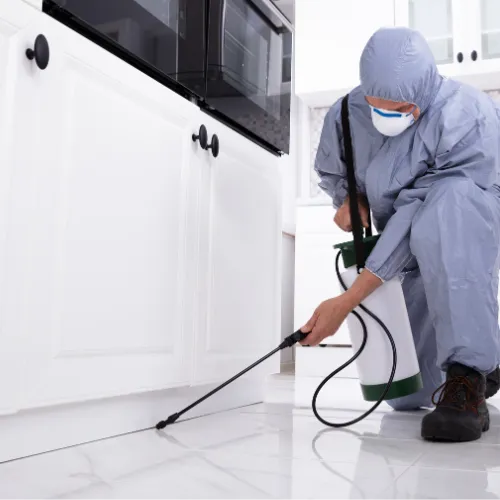Insurance for Pest Controllers
Your Pest Control Insurance Partner: Reliable, Affordable, and Comprehensive Coverage
Questions? Call us now on
02 9000 1155What is Pest Control Insurance?
Pest control insurance is a specific type of coverage designed for businesses in the pest control industry. This insurance protects companies from the unique risks they face while providing pest control services.


Why Pest Control Insurance is Important
Pest control insurance is crucial because it safeguards businesses from the unique risks associated with pest management services. This specialised insurance provides financial protection against potential liabilities, such as property damage, bodily injury, and professional errors. It ensures that unforeseen events, like accidents or lawsuits, don't financially devastate the business.
As a pest control company, you'll also instil confidence in clients, demonstrating a commitment to professionalism and safety. For a business involving chemicals, site visits, and potential environmental impacts, this insurance is an essential shield, securing your business' financial health and reputation.
What factors influence the cost of pest control insurance?
Factors influencing the cost include the size of the business, the types of services offered, the number of employees, previous claims history, and the specific risks associated with the business's pest control activities.



What insurance does a pest controller need?
Some of the essential insurances for a pest control business include public liability, professional indemnity, commercial vehicle, and workers' compensation insurance, crucial for legal compliance and financial protection.
Covers injury or property damage claims from third parties during pest control activities. Essential for legal and financial protection.
Protects against lawsuits for service errors or negligence in pest control. Important for covering legal costs and maintaining reputation.
Insures vehicles used in pest control against accidents, theft, and damage. Crucial for businesses reliant on transportation.
Workers' Compensation
Covers costs for employee injuries or illnesses from pest control work. Important for financial protection of both employees and the business.
What are important covers to consider?
When considering pest control insurance, it's important to focus on specific sections or terms that are particularly relevant to the nature of the business.
These can include:
Coverage Limits: Understand the maximum amount the insurance will pay per claim or incident. It's crucial to ensure these limits are sufficient for potential risks in pest control.
Exclusions: Pay attention to what is not covered. Some policies might exclude certain types of pests, methods, or damage caused by specific chemicals.
Pollution Coverage: Given the use of chemicals, make sure there's clarity on how the policy handles pollution liability, including accidental chemical spills.
Bodily Injury Liability: Ensure the policy covers injuries to third parties, including clients and others, during pest control operations.

FAQs
Yes, many insurers offer policies that can be customised to cover both residential and commercial pest control activities, ensuring comprehensive protection regardless of where services are rendered.
While not standard, cyber liability insurance can be added to pest control business policies to protect against data breaches and other cyber risks, especially important for businesses that store customer information electronically.
There are many insurances to consider, however, a pest management company should prioritise liability insurance to protect against third-party claims and professional indemnity to cover service-related liabilities.
Yes, public liability insurance is designed to cover the costs associated with property damage caused by a pest controller during their services.
Absolutely. Professional indemnity insurance can protect your pest control company if a client makes a claim against you for providing incorrect or inadequate advice.
The use of drones introduces unique liabilities and may require additional coverage. Insurers may offer specific policies or wording to cover drone use, including aerial surveillance and treatment applications.
Standard policies may not automatically cover subcontractors. It's often necessary to either ensure subcontractors carry their own insurance or extend your policy to cover subcontracted work. Review and clarification of the policy is essential to ensure adequate coverage.
Insurance policies for pest controllers can be tailored to include specific coverage for termite barriers and weed control, but it's important to confirm with the insurer or your broker.
To ensure full coverage, a pest control company should have a comprehensive business insurance policy that includes public liability and pollution coverage when applying pesticides.
The pest control team should immediately notify their insurer or insurance broker to initiate the claims process, providing all necessary documentation of the injury and incident.
Disclaimer: The content provided on this page is for general informational purposes only and does not constitute explicit advice, endorsement, or recommendation. While we strive to ensure the accuracy and reliability of the information presented, no guarantees are offered. It is essential for users to seek individual guidance or consultation to address their specific needs and circumstances. We are not responsible for any direct, indirect, incidental, or consequential damages or implications arising from the interpretation or use of the information available on this page.

